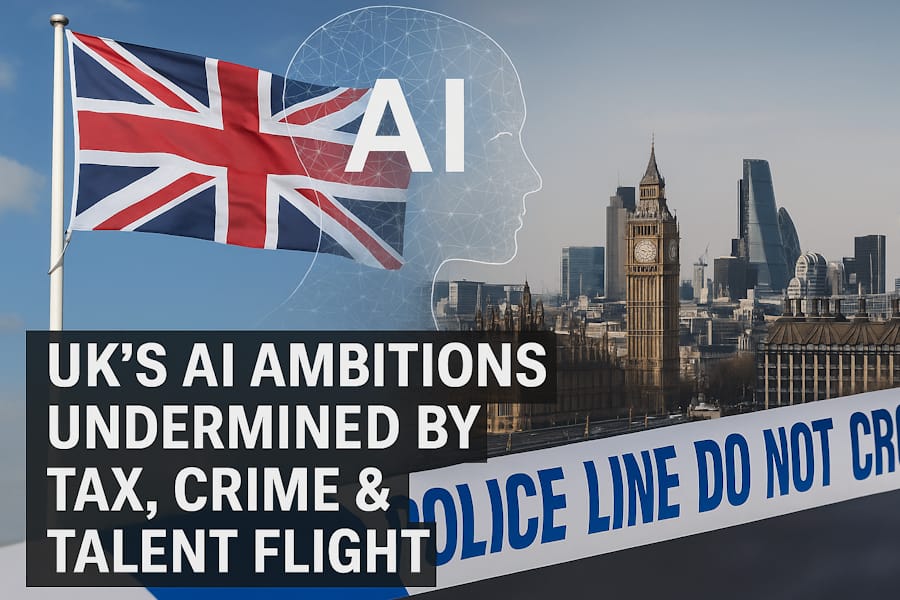🇬🇧 Britain’s Big AI Ambition at Risk Amid Tax Hikes, Crime Surge, and Talent Flight

Publish Date: Last Updated: 24th October 2025
Author: nick smith- With the help of CHATGPT
The Prime Minister’s vision to position the UK as a global AI powerhouse may be derailed by rising taxes, declining safety, and a growing exodus of top talent.
The UK government has made bold proclamations about becoming a world leader in artificial intelligence. From establishing AI-focused supercomputers in Edinburgh to pledging support for AI start-ups and upskilling 7.5 million workers by 2030, the ambitions are grand. However, a growing number of experts and business leaders argue that the UK’s wider economic and social environment may be undermining its very ability to achieve these goals.
A Tale of Two Policies: AI Innovation vs Taxation
While the government has promoted its AI credentials on the global stage, it has simultaneously introduced a series of tax hikes and workplace regulations that critics say are stifling the very innovation it hopes to encourage.
In 2023, the UK raised the corporation tax rate from 19% to 25% for businesses with profits over £250,000, while also tightening rules around non-domiciled tax status. These changes have not gone unnoticed by high-net-worth individuals. According to the 2024 Henley Private Wealth Migration Report, the UK is expected to lose 3,200 millionaires this year — more than any other country in the developed world.
“This is a classic case of giving with one hand and taking with the other,” says tax consultant Mike Warburton. “The UK wants to attract the brightest minds in AI but seems intent on penalizing success through complex regulation and high taxation.”
London’s Decline as a Global Talent Magnet
Adding to the concern is London’s declining reputation as a safe, attractive hub for professionals. A recent YouGov survey found that 66% of Londoners feel unsafe commuting at night, and crime data from the Metropolitan Police shows a notable increase in mobile phone thefts and violent assaults, particularly in Central London.
Reports of rising vandalism, including graffiti across public transport systems, and a spate of high-profile thefts have shaken public confidence. “There’s a growing perception — domestically and abroad — that the UK has lost control of law and order,” says sociologist Dr. Emeka Osei from King’s College London.
The result is a shifting preference among global AI talent. Cities in the UAE, such as Dubai and Abu Dhabi, now offer tax-free salaries, personal safety, luxury lifestyles, and fast-growing AI ecosystems. India is also investing heavily in AI education and infrastructure, while U.S. tech hubs like Austin and San Francisco continue to offer high salaries and global prestige.
The Missing Ingredients: What Top Talent Really Wants
In an increasingly competitive global market, countries vying for AI dominance must offer more than grants and initiatives. They must build environments where top talent wants to live and raise families. That means:
-
World-class education options
-
Robust law enforcement and safety
-
Affordable, high-quality housing
-
Low and stable taxation
-
Cultural respect for success and entrepreneurship
“The UK currently struggles on all these fronts,” says economist Jane Fuller, a fellow at the Centre for Policy Studies. “We’ve got a narrative that praises the ‘working man’ while subtly vilifying wealth and ambition. That’s a red flag for global professionals.”
The Cost of Political Contradiction
While the government talks of innovation and growth, it’s facing criticism for policies perceived as ideologically divisive. The proposed removal of VAT exemptions for private schools and speculation about differential access to NHS services have sparked concerns about a creeping culture war that pits professionals against public workers, wealth against welfare.
Meanwhile, recent government spending has exceeded projections, prompting economists to forecast further tax increases in the Autumn Budget. This risks further alienating business owners, investors, and highly skilled workers.
A Path Forward — If the UK Is Serious
If Britain is to become a genuine leader in AI, it must match its technological ambition with a more welcoming environment for high-skilled workers and entrepreneurs.
Experts suggest:
-
Revising tax policy to provide incentives for AI innovation, including targeted tax breaks for developers and investors
-
Launching urban safety initiatives, especially in London, to restore international confidence
-
Depoliticizing success by promoting a balanced narrative that celebrates achievement while supporting social equity
-
Strengthening infrastructure in housing, schooling, and transport to accommodate incoming global talent
Until then, the UK’s vision of AI leadership may remain just that — a vision.
Latest AI News Articles
AI Questions and Answers section for Britains Big AI Ambition at Risk Amid Tax Hikes, Crime Surge, and Talent Flight
Welcome to a new feature where you can interact with our AI called Jeannie. You can ask her anything relating to this article. If this feature is available, you should see a small genie lamp above this text. Click on the lamp to start a chat or view the following questions that Jeannie has answered relating to Britains Big AI Ambition at Risk Amid Tax Hikes, Crime Surge, and Talent Flight.
Be the first to ask our Jeannie AI a question about this article
Look for the gold latern at the bottom right of your screen and click on it to enable Jeannie AI Chat.





